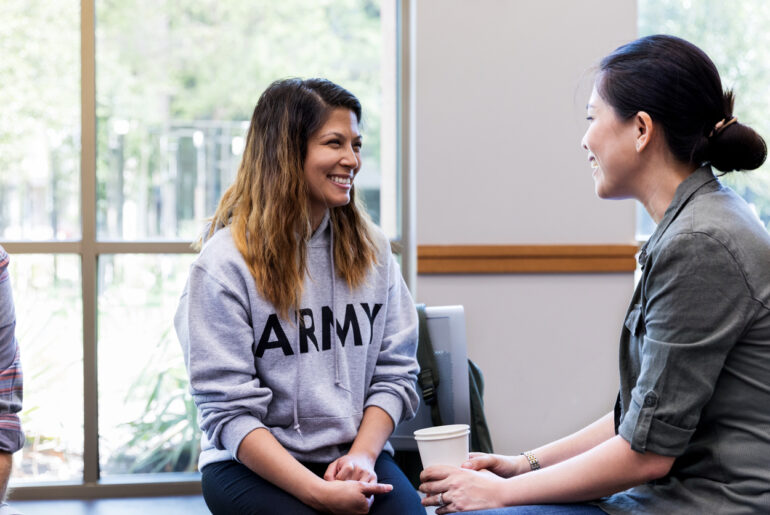Adjusting to life as a veteran college student comes with a unique set of challenges. Veterans are likely older than other students in their classes. They may be married, have children, and don’t usually live on campus. But while veterans may differ from “traditional” college students, they still may want to engage socially with their peers. So how can veterans find and connect with each other on campus?
“The primary advice is to connect with the veterans support services on campus. That’s the first thing I’d tell students, and seek out any social groups, or initiatives that are targeted toward veterans,” says Barbara Kent, Director of Eastern Kentucky University’s Office of Military & Veterans Affairs.
“It’s important to note that veterans are as diverse as any other population; however, veterans have an added layer of unique perspectives based on military branch, rank, military occupational specialty, experiences, time in service, and other variables that may present challenges when assimilating into the campus culture and connecting with other students.”
With those obstacles in mind, we asked Kent to share some tips for veterans transitioning into life as a college student. Here are five things veterans can do to connect on campus.
1. Search your school’s website for veteran programs
If you’re not a fan of gathering information in-person, spend some time combing through your school’s website for veteran-specific opportunities.
“University websites will have a wealth of information with regard to support services, and many have a dedicated office and website for veteran and military students. For universities that offer this, transitioning students will be able to access services regarding their benefits and entitlement, joint service transcript processing, academic advising, and many other services.”
And while you’re online, don’t forget to search for veteran student organizations on social media. Liking a group’s Facebook page or signing up for a newsletter is an easy way to stay updated and connected.
“The Office of Military and Veterans Affairs uses social media, emails, texts, and word of mouth to help get the word out about our services. We also hold a lot of events to get students together to strengthen peer-to-peer relationships.”
2. Don’t skip orientation
“Take advantage of any orientation sessions or transition workshops the school may offer, especially if they are geared towards veterans and/or non-traditional students. Not only will they provide valuable information, but it provides the opportunity for transitioning students to engage with their peers and develop relationships that are beneficial both in and out of the classroom.”
3. Meet with your advisor
“Develop a relationship with your academic advisor; they will be with you for the duration of your academic journey towards graduation. Recognize that being successful in the military does not always equate to automatic college success; veteran students should seek out help when navigating these new challenges.”
Your advisor may also provide advice on where to find services on campus.They may have suggestions for finding student-run clubs and could possibly connect you directly with other veteran students.
4. Get involved
Take advantage of the organizations offered on campus. And if a club for veterans doesn’t exist, start your own.
“Most recently, with financial support from our Office of Military and Veterans Affairs, the 14th chapter of Omega Delta Sigma, the national co-ed veteran fraternity, was established at EKU. We expect that as membership grows, so will the services and resources that are available to veteran students on campus.”
Kent added that bringing a chapter of the fraternity to EKU’s campus was a veteran student’s idea.
“He came to campus and saw that all these other students had groups and said,‘I want one for myself.’ Veterans want the same opportunities and experiences as other students, but they also want to find their tribe, so to speak. They want to feel comfortable engaging with other students who share similar experiences.”
5. Visit your school’s veterans services department
Your school’s veteran services department will likely include access to more resources than you think.
“EKU’s Office of Military & Veterans Affairs has a long history as a top ‘Best for Vets’ university, based upon the fact that we distinguish ourselves by having a ‘one-stop-shop’ for student veterans, where they can apply for benefits and entitlement, receive academic and VA Vocational Rehab counseling, get book vouchers, receive priority registration for classes, and get information about services offered on campus and in the community.”
Putting in the effort to connect with other veterans on campus may initially take you outside your comfort zone, but the benefit of building camaraderie with your peers will be worth it.
Still looking for the right school? Try using our College Search Tool, where you can search by major, location, or keyword to find the best fit for you.



